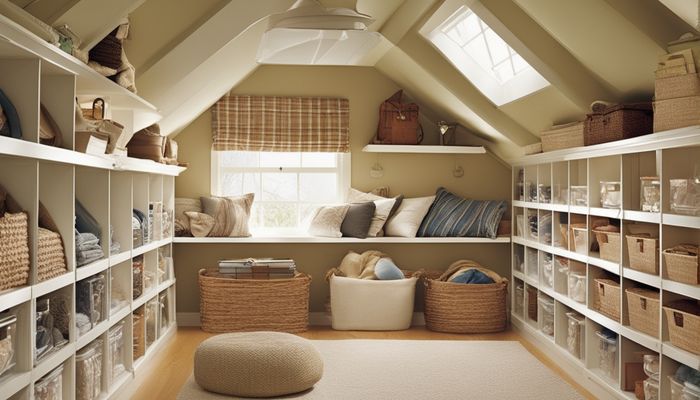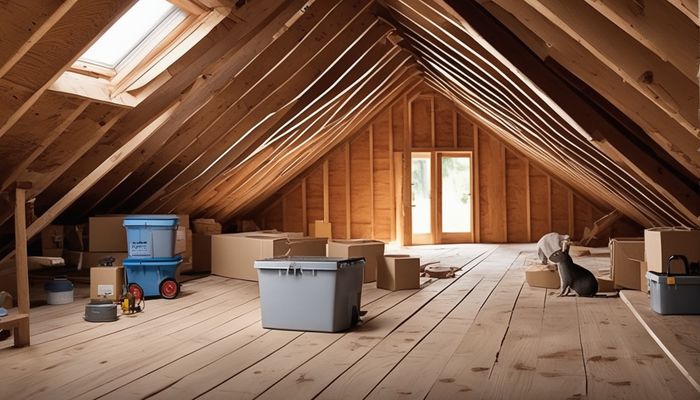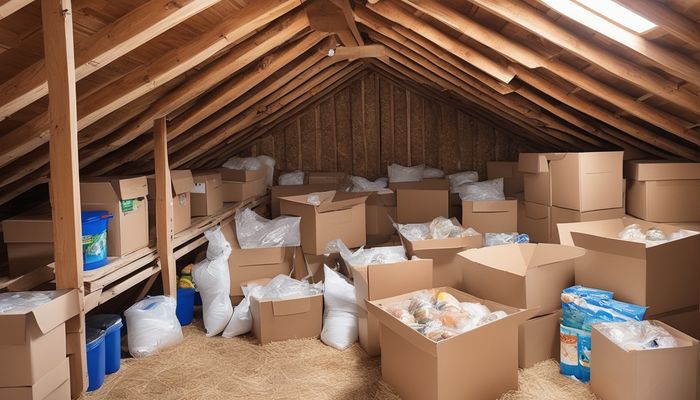There are several items you should avoid storing in the attic due to potential damage or safety concerns. Attics are often subject to temperature fluctuations, humidity, and other environmental factors that can affect the condition of stored items.
What Not to Store in Attic? [08 Items]

01. Fragile items
The attic is a harsh environment for delicate items. The temperature and humidity levels can fluctuate wildly, which can cause damage to furniture, artwork, and other fragile items.
02. Food
Food should never be stored in the attic, as it can attract pests and rodents. Even if you think you’ve sealed the food tightly, pests can still find a way in.
03. Flammable materials
Items such as gasoline, paint thinner, and fireworks should never be stored in the attic. These materials are a fire hazard, and if they ignite, the fire could spread quickly throughout the attic and into the rest of the home.
04. Electronics
The attic is a hot and humid environment, which can damage electronics. Even if you store your electronics in a sealed container, the heat and humidity can still penetrate and cause damage.
05. Papers
Important papers, such as birth certificates, tax records, and insurance policies, should not be stored in the attic. The attic is a damp environment, and paper can easily mildew or rot.
06. Toxic materials
Toxic materials, such as cleaning products, pesticides, and batteries, should not be stored in the attic. They can off-gas harmful fumes and pose a health hazard.
07. Pet food and litter
Pet food and litter can attract pests and rodents. They can also create a foul odor in the attic.
08. Personal belongings
Personal belongings, such as jewelry, documents, and photos, should not be stored in the attic. They are susceptible to damage from the high temperatures and humidity, as well as from pests and rodents.
If you’re not sure whether an item is safe to store in the attic, it’s always best to err on the side of caution and store it elsewhere.
Potential Attic Storage Risks

Pests and rodents
The attic is a dark and undisturbed place, which is perfect for pests and rodents to make their home. If you store food in the attic, it will attract pests, such as mice, rats, and cockroaches. These pests can cause damage to your belongings and spread disease.
Fire
Flammable materials, such as gasoline, paint thinner, and fireworks, should never be stored in the attic. These materials are a fire hazard, and if they ignite, the fire could spread quickly throughout the attic and into the rest of the home.
Water damage
If the attic leaks, any items stored there could be damaged by water. This includes furniture, electronics, and papers.
Mildew and mold
The attic is a damp environment, which is perfect for mildew and mold to grow. If you store paper or fabric items in the attic, they could be damaged by mildew or mold.
Protect Attic-stored Items With These Tips.
- Inspect the attic regularly for signs of pests or moisture.
- Store items in sealed containers.
- Use a dehumidifier to keep the humidity levels down.
- Avoid storing food or flammable materials in the attic.
People also ask: How to Clean Garbage Disposal?
My Personal Experience on What Not to Store in Attic?

Once, I had the opportunity to work with a client who had stored a significant amount of food in their attic. The food mainly consisted of canned goods and dry items, along with some fresh fruits and vegetables. However, the client hadn’t been regularly inspecting the attic.
During my cleaning process in the attic, I noticed a considerable amount of moisture in the air, and the temperature seemed quite warm. Curious, I decided to open one of the sealed containers of food, only to be immediately hit with a strong odor of mildew. Sadly, the food had completely spoiled.
I informed the client about the unfortunate situation, and they were understandably upset. They had assumed that storing food in the attic would be safe, not realizing the harsh environment it created.
As a result, the client had to dispose of all the spoiled food and tackle the issue of excess moisture in the attic. It was a costly mistake, but they learned a valuable lesson from it.
This experience taught me the utmost importance of regularly inspecting attics and storing food properly. I came to realize that the attic is not a suitable place to store food, even if it’s in sealed containers.
I share this personal experience to illustrate the potential dangers of storing the wrong items in an attic. If you find yourself using the attic for storage, please ensure you take the necessary precautions to protect your belongings from damage.
